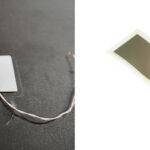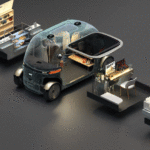UC Merced Professor Yue ‘Jessica’ Wang and her team’s laboratory are spearheading an ambitious project to research conjugated polymers. Conductive plastics, and other artificial conductors that are artificially manufacturable, have advantages over metals like copper. Although printing plastics with such properties is a feat all of its own, the possibilities conjugated polymers present become even more intriguing in the realm of electronics. As Wang explains:
“With mined materials the Earth has created, we are rather restricted with their physical properties. With synthetic polymers, we can infuse virtually any desired electrical, mechanical or optical properties because we get to create them in the lab. They can be made stretchable, self-healing and biodegradable — properties we don’t commonly associate with electronics. They are becoming the building blocks for all kinds of innovations.”
Electrical Polymers
The team uses a whole set of different processes to create conjugated polymers. The process could also allow for the creation of wearable electronics or medical devices. On top of that, the materials are really easy to recycle and present fewer dangers in production. They may even be reusable, so the research has the potential to present flexible, longer lasting materials and electrical devices.
The team has a whole range of varying specialties that make the whole process come alive. Rob Jordan designs and synthesizes materials with programmable physical properties, while Ian Hill, a third-year grad student, transforms these materials into an extrudable form through a 3D printer to create electronic components of shapes that perfectly resemble the 3D topography of human bodies. Victor Hernandez, a first-year grad student, analyses the polymers and figures out ways to improve their resilience and conductivity.
Kiana Shirzad, a second-year grad student from Iran, is combining materials to create properties not observed in either of the original components. John Misiaszek, a third-year undergrad from Encinitas, designs and builds instruments the team uses to conduct its research, including 3D printing a custom 3D printer that tailors to the processing needs of materials the team developed.
The work done by Wang and her team is sure to draw eyes and ears soon. Professor Wang already earned a $25,000 award for being a finalist in the Moore Inventor Fellowships competition earlier. She has put the money right back into the lab. They are sure to make further interesting discoveries in the world of polymers and metamaterials.
Featured image courtesy of UC Merced, retrieved via their website.












